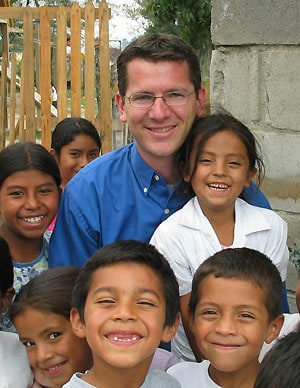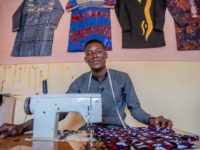This week we continue our 10 Questions series on Compassion’s holistic child development model with Brandy’s interview with Dr. Scott Todd, Special Operations Director for Compassion.

Compassion’s Complementary Interventions (CIV) activities, which include the AIDS Initiative, are headed by Scott Todd. Scott, a pediatric AIDS expert, is passionate about meeting each and every need of the children served by Compassion. Recently, he shared how he sees CIV accomplishing that goal.
1. What is CIV?
CIV is Compassion’s Complementary Interventions program. To be honest, we played around with a lot of titles for this program. Complementary seems like a weak word for such a strong program. But it really does describe what CIV does — it complements, completes our core mission of releasing children from poverty in Jesus’ name. In essence, CIV ensures that we are able to go the distance, to provide everything that’s necessary for children registered in our program. While $32 a month goes a very long way in developing countries, there are still unexpected needs. Homes are destroyed in floods. Children need expensive AIDS treatment. All things that exceed that $32 a month. That’s where Complementary Interventions come in.
2. What are some of the specific ways CIV complements Compassion’s core ministries?
Complementary Interventions are woven throughout Compassion’s Child Development Model. In the Child Survival Program, for example, Complementary Inventions provide medication for HIV-positive mothers that decrease their chances of passing the virus on to their unborn children. In the Child Sponsorship Program, I have seen CIV cover the medical costs of a child’s open-heart surgery, as well as covering his travel to a state-of-the-art hospital in another country. Because of the AIDS Initiative, an arm of CIV, church partners can put on training events in their communities, teaching families about awareness. Complementary Interventions exist to strengthen our other programs, and I’ve seen it work. Literally thousands of kids would not be alive were it not for CIV.

3. Does CIV target different donors than our other programs?
First of all, a lot of people who give to CIV are already sponsors. But, I also believe that CIV is reaching a different group as well. Let’s say you have someone who feels very passionate about the AIDS crisis or about eradicating malaria. That person may never feel led to be a sponsor — that doesn’t connect with them. But through Complementary Interventions, they can give to what they’re passionate about. Not only can they give, but once they do, we can show them how it’s working. It’s a new, exciting point of initiation for Compassion.
4. How do Complementary Interventions differ from a community development program?
In each of our programs, including CIV, Compassion focuses on child development — not community development. By focusing on early childhood, we are often able to change a child’s life before fatalism, before he or she experiences stunted growth from disease, before that child gets behind in school. We believe that a changed child will transform his or her community.
5. Does sponsorship ever cover things like building wells, etc.?
Sponsorship funds directly benefit a specific child. We believe a sponsor’s money should benefit that individual child in a way we can document. But as I said before, sometimes that sponsorship amount of $32 a month isn’t enough, especially for children suffering from AIDS or other medical problems. But Complementary Interventions are also used to indirectly help children. If children are dying from lack of clean water, a church can ask for CIV funds to dig a well. This clean water will absolutely help the children at that center — but since it is indirect, that funding will come from CIV, rather than sponsorship.
Come back tomorrow for the rest of Brandy’s interview with Scott.
Read all the posts in the 10 Questions series.
Brandy Campbell is a feature writer at Compassion International. When she’s not chatting with Compassion execs, Brandy writes newsletter and web stories about Compassion’s ministry to children in poverty.







5 Comments |Add a comment
Scott thanks for explaining simply what CIV is and does. What you said made perfect sense and is what I sort of guessed and had heard a little of, but thanks for the blog!!! I tend to think Compassion is just Child Sponsorship, but there are so many facets!!!
I Peter 5:7 “Cast all your anxiety on Him because He cares for YOU!!!”
When someone says they “have a heart” for something it usually means they feel a desire for it or are passionate about it. Feelings and desires are driven from two things. The first is your investments. “Where your treasure is there your heart will be also.” Treasure is not just money, it is your investment of time and what you allow your mind to dwell on – what you think about will shape what you feel. The second force that shapes your heart (feelings/desires) is God. God is in the business of transforming our feelings (hearts) to align with His own.
So, to answer your question I would say two things. One, invest your time and thought in understanding God’s view of poverty and the poor. Study scripture on the poor and learn more about the situations they face. Two, pray that God will align your heart to His own.
If you sense God working in your heart and a love for others who are hurting begins to emerge then start acting on it. Once you act upon your love for others that love will grow because you are investing more of yourself in the things of God. In fact, scripture tells us that as you minister in love to those in need you are ministering to Jesus and you will discover how God feels toward you.
How do you get a heart for this type of ministry? Maybe I am asking what question should I be asking to have a heart for this type of ministry? Please help.
I just found your blog in a link from ODUSA’s new blog, and I wanted to thank you for it! I am looking forward to following your wonderful work here, and I’ve linked to you at Remember Ambassadors – http://rememberambassadors.com.
Thanks, and God bless your work!